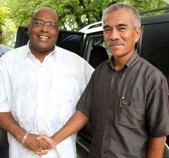Climate Change Adaptation and Mitigation
PEPP believes that adaptation and mitigation strategies are both necessary to increase the survivability of low-lying Pacific Island nations threatened by global climate change. We support realistic efforts to mitigate climate change through carbon sinks, targeted decreases in greenhouse gas emissions, and other measures designed to lower or offset carbon footprints.
Although industrialized countries are responsible for most human-generated carbon dioxide, residents of Small Island Developing States (SIDS) also have high carbon footprints, because of their economic dependence on tourists and goods traveling across great distances. PEPP focuses on helping SIDS lower their carbon footprints substantially by freeing them of dependence on fossil fuels for power generation.
We support efforts to protect coral reefs from the twin threats of global warming and ocean acidification. Noting that in 2012 the population of Planet Earth outstripped food production for the first time in recorded history, we are deeply concerned with the growing problem of food security, especially for the residents of outlying Pacific atolls. PEPP supports agronomics, soil, coral reef, livestock, and forest management, and Climate-Smart Agriculture.
PEPP also believes strongly in technical vocational education and training (TVET) as an important and viable strategy for climate change adaptation. TVET can equip Pacific Islanders with the portable skills and remittances they need to increase the tenability of their native economies and/or contribute meaningfully to the prosperity of their adopted societies. PEPP seeks greater international support for diversified, distributed and national TVET programs, augmented by Australia-Pacific Technical Colleges, private sector apprenticeship programs, and a restored, more regionally-focused Ponape Agriculture and Trades School.









